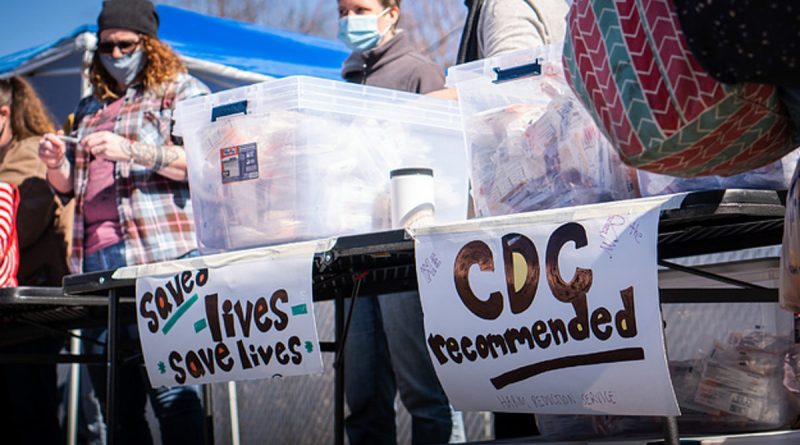A West Virginia Law May Drive Needle Exchanges Underground
[ad_1]
“You’re actually talking about human beings here,” said one needle exchange program director. “This will kill them.”
West Virginia Gov. Jim Justice on Thursday signed a law restricting needle exchanges in the state, likely shuttering or driving many underground. The move came despite a worsening HIV outbreak, a crisis that needle exchanges have repeatedly been shown to help stop.
In February, a CDC official told a Charleston, West Virginia, city council committee that the country’s “most concerning” HIV outbreak was occurring among people using injection drugs there. Despite needle exchanges helping limit past outbreaks in Indiana and West Virginia, the state will now regulate the programs for the first time. It’s a move that supporters, such as Justice, say is based on “good science,” but which public health experts say will hobble the programs, worsening the HIV outbreak and leading to more people dying from drug overdoses.
“You’re actually talking about human beings here. This will kill them or make them sick,” Laura Jones at Milan Puskar Health Right in Morgantown, West Virginia, told BuzzFeed News.
Programs in one of the three counties Jones’ programs operate in will likely be shut down by the law’s requirements that county politicians and city officials approve of them. “This is just going to drive some programs underground,” she said.
Chad Cordell
HIV testing at a Charleston, West Virginia, needle exchange.
The basic idea behind needle exchanges — shown to be effective in two decades of public health research and endorsed by the Trump administration — is to give new needles to people using illegal drugs so they don’t share used ones and spread disease, while also offering them healthcare and an entry point into treatment. There are more than a dozen needle exchange programs in West Virginia, already hit hard by the nationwide epidemic of illicit opioid drug use and overdoses. The HIV outbreak in Charleston followed the city ending its own needle exchange program in 2018 over complaints about needle litter. Similarly, nearby Cabell County limited its program that year to people willing to use state identification, which cost it half of its participants and sparked an HIV outbreak there.
“When you have an HIV outbreak, you want to get needles to as many people as possible. This law will instead shut down almost every program in West Virginia,” said West Virginia University public health expert Robin Pollini. Local politicians are unlikely to OK the programs, she said.
Additionally, the restrictions contradict CDC guidelines for needle exchanges, making it likely that other health conditions, like hepatitis and endocarditis, will increase along with drug overdoses since the programs are a leading provider of the overdose-reversing drug naloxone in the state. “This will be the strictest needle exchange law in the country, and I worry it will be a model for other states trying to regulate them out of existence,” said Pollini.
Supporters of the new law, such as lead sponsor state Sen. Eric Tarr, have said it is aimed at eliminating needle litter and programs that don’t automatically enroll drug users into recovery programs. Among other restrictions, the law would require needle exchanges to label syringes (linking the needle to a user) and mandate state licensing to operate. Against CDC recommendations, exchanges would strive for matching the number of needles handed out with the number of returns, could only give needles to people with state-issued identification (discouraging people experiencing homelessness or people using illicit drugs who fear being arrested from participating), and would prevent people from picking up needles for other participants, which can be helpful in a rural state with limited public transportation.
Chad Cordell
A SOAR needle exchange event in March.
The law seems particularly aimed at needle exchanges not connected to local health departments, like Charleston’s Solutions Oriented Addiction Response (SOAR) nonprofit. Charleston’s police department investigated SOAR in undercover operations before concluding in January it wasn’t breaking any law against operating without a license, because the state doesn’t offer licenses. The group helped uncover the HIV outbreak in Charleston last fall by offering testing to participants, along with food and medical care.
In late March, Sen. Joe Manchin of West Virginia demanded an inquiry into the CDC’s finding of an HIV outbreak in Kanawha County, where Charleston is located. Instead of asking for help from the federal health agency as would normally happen in such an outbreak, Kanawha County commissioners questioned the CDC’s evidence for an HIV outbreak, based on medical test results reported to the state health department. The city has postponed voting on its own needle exchange ordinance until April 19, while it waits for the state licensing law to go through.
“There’s no doubt in my mind, or any freshman public health analysis, that this bill is an HIV-spreader,” said SOAR coleader Joe Solomon in an email. “We’re not going to let more of our people die, or get HIV, if we can help it.”
“Imagine if giving out masks were illegal during COVID-19: would you still make sure your family and loved ones were protected?” asked Solomon. “Of course you would.”

